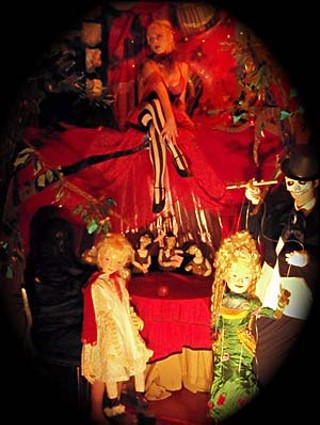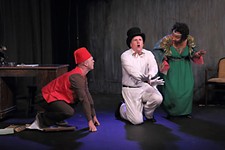The Pomology of Sweetness and Light
This musical drama about Johnny Appleseed, told with puppets, bears sweet fruit
Reviewed by Wayne Alan Brenner, Fri., June 18, 2010

The Pomology of Sweetness and Light
Blue Theatre916 Springdale
Through June 20
Running time: 1 hr., 30 min.
The Black Forest Fancies, a group of industrious tatter-punk puppeteers founded by Pandora Andrea Gastelum and Nina C. Nichols, have journeyed from New Orleans to present a history-steeped musical drama about Johnny "Appleseed" Chapman and what might have happened if that spiritually energized and wide-ranging worthy had actually married the, ah, 10-year-old girl to whom he was engaged. No, this is no hentai tale of underage debauchery in the early 1800s: Chapman was as chaste as he was peripatetic, and his putative child bride remained untouched by those hands that sowed the seeds. But still, what an interesting story, suffused with tunes and singing reminiscent of the Handsome Family's more Appalachian stylings.
And what a group to present it, too; little wonder that the Fancies' work has garnered funding from the Jim Henson Foundation. The performers, most often clothed in elegant Victorian gowns blacker than a BP pelican, walked and danced and whirled their articulated, almost human-sized puppets around the stage with such sharp choreography that the narrative and spectacle were able to compensate for the technical difficulties (a colicky video projector, a poorly cooling air conditioner) that had delayed the show's start. The action unfolded among numerous fabric-based set-pieces – also whirled and artfully arranged into place, some redolent of many months of stitching and painting and craftwork, as if the better two-thirds of Etsy had come to life to assist the troupe – that were so wonderful in style and substance that a viewer was only intermittently distracted by the rude audience members in the back row who seemed unable to keep their yapping pieholes shut for more than 10 minutes at a time.
The Black Forest Fancies, who have a growing history of creating puppet-driven stage shows that are the embodiment of what Dame Darcy or Melora Creager might dream about during their more fruitful sleeps, deserve respectful silence, we'd suggest, except where that silence might be helplessly punctuated by soft gasps of delight as the larger papier-mâché puppets (in this case representing angels from heaven) make their appearance in the story and on the stage. There was a hungry wolf in this tale, too, a brief companion to the nation-roaming Chapman and his ward; that wolf, effectively animated through a full-body costume, an evocative mask, and much lupine loping, might have happily supped on the hearts of those attendees incapable of shutting the fuck up while true artists are about their business.










